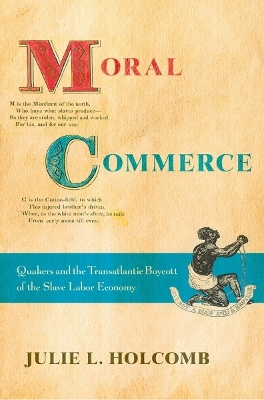
Moral Commerce
Cornell University Press (Verlag)
978-1-5017-4849-3 (ISBN)
Quaker antislavery rhetoric began with protests against the slave trade before expanding to include boycotts of the use and products of slave labor. For more than one hundred years, British and American abolitionists highlighted consumers’ complicity in sustaining slavery. The boycott of slave labor was the first consumer movement to transcend the boundaries of nation, gender, and race in an effort by reformers to change the conditions of production. The movement attracted a broad cross-section of abolitionists: conservative and radical, Quaker and non-Quaker, male and female, white and black.
The men and women who boycotted slave labor created diverse, biracial networks that worked to reorganize the transatlantic economy on an ethical basis. Even when they acted locally, supporters embraced a global vision, mobilizing the boycott as a powerful force that could transform the marketplace. For supporters of the boycott, the abolition of slavery was a step toward a broader goal of a just and humane economy. The boycott failed to overcome the power structures that kept slave labor in place; nonetheless, the movement’s historic successes and failures have important implications for modern consumers.
Julie L. Holcomb is Assistant Professor of Museum Studies at Baylor University. She is the editor of Southern Sons, Northern Soldiers.
Introduction: A Principle Both Moral and Commercial
1. Prize Goods: The Quaker Origins of the Slave-Labor Boycott
2. Blood-Stained Sugar: The Eighteenth-Century British Abstention Campaign
3. Striking at the Root of Corruption: American Quakers and the Boycott in the Early National Period
4. I Am a Man, Your Brother: Elizabeth Heyrick, Abstention, and Immediatism
5. Woman's Heart: Free Produce and Domesticity
6. An Abstinence Baptism: American Abolitionism and Free Produce
7. Yards of Cotton Cloth and Pounds of Sugar: The Transatlantic Free-Produce Movement
8. Bailing the Atlantic with a Spoon: Free Produce in the 1840s and 1850s
Conclusion: There Is Death in the Pot!
| Erscheinungsdatum | 18.05.2020 |
|---|---|
| Zusatzinfo | 6 Halftones, black and white |
| Verlagsort | Ithaca |
| Sprache | englisch |
| Maße | 152 x 229 mm |
| Gewicht | 454 g |
| Themenwelt | Geschichte ► Teilgebiete der Geschichte ► Wirtschaftsgeschichte |
| Wirtschaft ► Volkswirtschaftslehre ► Makroökonomie | |
| ISBN-10 | 1-5017-4849-1 / 1501748491 |
| ISBN-13 | 978-1-5017-4849-3 / 9781501748493 |
| Zustand | Neuware |
| Haben Sie eine Frage zum Produkt? |
aus dem Bereich


